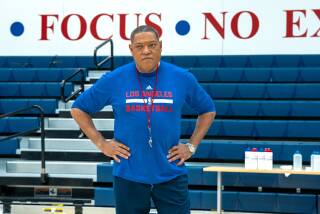Column: CalPERS says its ex-CFO misrepresented his background — but how did he get hired in the first place?
CalPERS has now reported that its former chief financial officer, Charles Asubonten, misrepresented his work history and earnings before he was hired in October 2017. He resigned quietly in May, and the giant pension fund plainly desires to close the book on this disastrously botched appointment of a top-level official.
But things aren’t that simple. The Asubonten case raises questions about CalPERS management that demand a complete public airing before the system’s board of administration, starting with the question: How did he get hired in the first place?
Asubonten’s misrepresentations were discovered in April, when CalPERS started asking him questions and checking his bona fides. The discrepancies, as they’re laid out in a report the system’s investigators prepared, were so glaring they could not have been missed had the same questions been asked and checked during the recruitment process.
You were evasive, failed to answer questions directly, and gave inconsistent answers to similar questions.
— CalPERS investigators to ex-CFO Charles Asubonten
But the proper inquiry wasn’t made until doubts about Asubonten’s background were raised by Susan Webber, a management consultant and financial blogger who posts at nakedcapitalism.com under the pen name Yves Smith, and subsequently by ourselves.
What took so long?
The issue is important because the California Public Employees’ Retirement System, which manages pension benefits and healthcare coverage for 1.9 million state and local workers and retirees, is engaged in recruiting a replacement CFO and a chief investment officer.
Marcie Frost, the CalPERS CEO, says the hiring process has been improved, but how would we know, until the prior procedure is thoroughly examined and the “improvements” described, in detail?
Let’s briefly recap the Asubonten affair.
CalPERS made a big noise last September when it hired Asubonten, then 55, as chief financial officer, a post with base pay of $275,000. The pension fund issued a news release describing him as bringing “more than 20 years of experience in many facets of finance and investments, covering several industries including mining, financials, energy, infrastructure, technology, healthcare, and industrials all across America, Africa, Europe, Australia, and Asia.” The release said that “most recently, he was the managing director in a private equity firm.”
As we reported, the “private equity firm” mentioned in the release was nothing of the kind, at least not as that term is commonly understood. Typically, a “private equity firm” manages partnerships that invest in a portfolio of private companies and generally oversee their management. The goal is to build up the portfolio companies so they can go public or be acquired by someone else.
Asubonten’s firm, Transmax/RSA Capital, didn’t appear to function that way. Asubonten told me in an interview in April that Transmax didn’t raise capital in the U.S. Through the firm, he said, he “advised people who raised funds on their own.” Asked how big Transmax was, he told me, “That is something I do not choose to discuss.”
Once Webber started blowing the whistle on Asubonten’s background, CalPERS closed ranks behind him. He had dismissed her questions as “character assassination,” an assertion later repeated to me by a CalPERS spokesman. In a phone conversation, with Asubonten on the line, Frost gave him an unqualified endorsement. “We thought Charles would be an excellent candidate,” she said, “and over the last five months that has proven to be exactly true.”
But she also initiated an investigation into his work history. CalPERS investigators interviewed Asubonten on April 20 and 23. According to their account, his story appears to have come apart almost instantly. As Webber and I already had reported, the address he had given the pension fund for Transmax was a mail drop in a strip mall outside Baltimore. He had not registered Transmax as a business, though he later claimed that wasn’t legally required.
Asubonten had claimed monthly salary from Transmax of $23,750. Asked to document the figure, he submitted W-2 forms for 2017 from three other purported employers, including the CFA Institute, an outfit that certifies Chartered Financial Analysts, for which he graded papers, and Rio Tinto, a British mining firm. But the Rio Tinto income statement covered earnings from 2007 to 2009, not 2017.
Asked how those earnings applied to Transmax, Asubonten told the investigators, “‘I am Transmax and RSA,’ or words to that effect,” the investigators reported. He added, “‘I consider everything as Transmax,’ or words to that effect.” That made Transmax sound like a corporate shell for Asubonten, not a private equity firm. On his Form 700, a financial disclosure the state requires from high-level public appointees, Asubonten valued Transmax at “over $1,000,000.” The investigators reported that he provided no records to document that value.
In general, the investigators found Asubonten not to be “credible during the investigation.” They informed Asubonten, “You were evasive, failed to answer questions directly, and gave inconsistent answers to similar questions.” They ruled that he had provided “false, incomplete, incorrect, and misleading information” on his employment application. Their conclusion was that it was proper to “reject” Asubonten as CFO during his probation. According to a settlement reached between him and CalPERS on July 10, he is considered to have tendered his “voluntary resignation.”
CalPERS tried to keep Asubonten’s fate quiet — the fund did not issue an announcement of his departure, although when we asked in May it acknowledged he was “no longer with CalPERS.” But then Asubonten appealed his dismissal to the state personnel board, and the investigators’ findings became public. Asubonten couldn’t be reached, and his attorney didn’t respond when we called.
But in his appeal, Asubonten argued that it was improper for CalPERS to use alleged misstatements on his Form 700 against him, since he maintains the form is designed chiefly to identify potential conflicts of interest. (On the other hand, its subjects are required to certify that it’s true “under penalty of perjury.”)
He said that as he is “not an attorney,” he had “some difficulty describing the corporate structure of Transmax” on the form. But given that in his appeal he described Transmax as a “sole-proprietorship,” it’s unclear why he checked a box on the form identifying it as a “partnership,” when a box labeled “sole proprietorship” is right next to it.
Asubonten also cited Frost’s unqualified expression of support in their April conversation with me. That’s embarrassing for her, at least, but also brings us back to what kind of hiring process was in place when he was recruited. Webber calls this a “due diligence failure,” and she’s right.
“There was vetting,” Frost told me this week. But what kind of vetting? She said Asubonten was interviewed and his references checked, and was found to be “technically qualified for the job” of CFO. But plainly CalPERS didn’t bother to inquire closely into Transmax, or it would have discovered that it wasn’t a “private equity firm” as commonly understood, wasn’t registered anywhere as a business, and had a mail drop as its official address. Would that have inspired CalPERS to take a closer look at its technically qualified candidate? One would hope so.
Frost says CalPERS has put the recruiting and vetting process for its new CFO and CIO in the hands of the executive search firm Korn Ferry. But it had commissioned the search firm Heidrick & Struggles to manage the search for its last CFO. By the time Asubonten was hired, however, CalPERS had taken the process in-house, and it yielded a candidate who couldn’t pass probation.
It’s certainly encouraging that CalPERS has “has taken a serious look” at its procedures in the wake of the Asubonten botch, as Frost says. “We have found areas where we can strengthen the process,” she told me, though she wasn’t very specific.
Maybe the CalPERS board can get a more complete answer, but to do so it will have to start asking questions and devoting serious time to figuring out what due diligence is performed on high-level CalPERS applicants. Or doesn’t it think that the way CalPERS fills some of its top jobs is important?
Keep up to date with Michael Hiltzik. Follow @hiltzikm on Twitter, see his Facebook page, or email [email protected].
Return to Michael Hiltzik’s blog.
More to Read
Inside the business of entertainment
The Wide Shot brings you news, analysis and insights on everything from streaming wars to production — and what it all means for the future.
You may occasionally receive promotional content from the Los Angeles Times.











